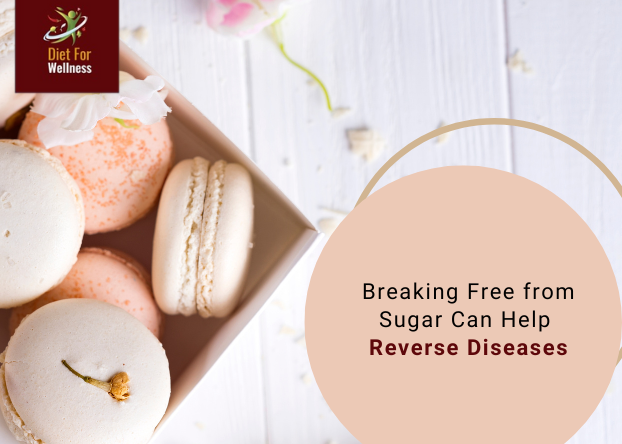Breaking Free from Sugar Can Help Reverse Diseases

Over 60% Indian adults consume more sugar daily than recommended by dietary guidelines. This overconsumption is a major contributor to obesity and significantly raises the risk of serious health issues, including heart disease, type 2 diabetes, cognitive decline, depression, and certain cancers.
Sugar- Natural vs. Added
While cutting out added sugars is a healthy goal, eliminating all sugar is not only difficult but also potentially harmful, as it would mean avoiding nutrient-rich foods. Sugar occurs naturally in fruits, vegetables, and dairy, providing essential nutrients. It’s the added sugars we need to be mindful of.
Identifying Added Sugars
When reading food labels, watch out for these common types of added sugar
- Refined Sugars- Brown sugar, confectioner’s (powdered) sugar, sucrose, turbinado sugar.
- Syrups- High fructose corn syrup, honey, dextrose, fructose.
- Sugar Alcohols- Mannitol, sorbitol, xylitol. (These can sometimes cause digestive upset in large amounts.)
You need to focus on reducing or eliminating these added sugars. This will help you to improve your health without sacrificing the nutritional benefits of naturally occurring sugars.
Reducing Added Sugars, Not Natural Sugars
For everyone, regardless of age or current health, significantly reducing or eliminating added sugars is a wise health decision. It’s crucial to distinguish between added sugars and natural sugars. Natural sugars, found in fruits, some dairy, and certain vegetables, are accompanied by essential nutrients like fiber, vitamins, and minerals. These foods are vital components of a healthy diet when consumed in moderation and are not linked to the same health risks as added sugars.
Targeting Added Sugars
The real culprit is added sugars, those introduced during food processing, production, or cooking. These sugars take various forms, from refined sugars like white and brown sugar or corn syrup to seemingly healthier options like honey and maple syrup. Regardless of their source, added sugars provide empty calories with minimal to no nutritional value. This makes them unnecessary and harmful when consumed in excess.
Beyond Weight and Blood Sugar
Eliminating or drastically reducing added sugars yields benefits far exceeding improvements in weight and blood glucose levels.
Powerful Benefits of Cutting Added Sugar
- Achieve Weight Loss Goals
Reducing added sugar lowers calorie intake, aiding weight loss and maintenance. Studies link excess added sugar to overweight and obesity. Swapping sugary foods for healthier alternatives can significantly cut calories.
- Reduce Diabetes Risk
High sugar intake, especially sugary drinks, increases type 2 diabetes risk. Cutting added sugars improves weight management and blood sugar control, breaking the cycle of insulin resistance.
- Slow Skin Aging
Lowering sugar intake may reduce AGEs (advanced glycation end products), which accelerate skin aging. A diet rich in fruits and vegetables further supports skin health.
- Strengthen Your Immune System
Added sugars contribute to chronic inflammation, weakening the immune system. Reducing sugar intake minimizes inflammation, enhancing the body’s ability to fight illness.
- Curb Sugar Cravings
Sugar triggers dopamine release, leading to cravings. Cutting back can cause temporary withdrawal symptoms, but cravings diminish over time. Gradual reduction can minimize side effects.
- Improve Mental Clarity
High added sugar intake is linked to depression, anxiety, and cognitive decline. Reducing sugar may improve mood and memory, potentially by reducing brain inflammation.
- Regulate Appetite
Excess sugar can disrupt leptin, the hormone that regulates appetite. Cutting added sugars can restore leptin function, improving fullness signals.
- Boost Energy Levels
Reducing sugar stabilizes blood sugar, preventing energy crashes. This leads to sustained energy and may also improve sleep quality.
- Protect Heart and Brain Health
Excessive added sugar intake increases the risk of cardiovascular disease and stroke. Reducing sugar can lower blood pressure, reduce inflammation, and improve lipid profiles.
- Prevent Cavities
Added sugars feed bacteria that cause tooth decay. Reducing sugar intake protects tooth enamel.
Guide To Conquer Your Sugar Cravings
You are not the only one who is feeling trapped by sugar cravings. How to get rid of it?
Replace, Don’t Deprive
Instead of a sudden, restrictive sugar ban, focus on building a foundation of nutritious, satisfying foods. Fill your plate with whole grains, colorful fruits and vegetables, healthy fats, and lean protein. These foods digest slowly, keeping your blood sugar stable and reducing those intense sugar cravings.
Practical Tips to Break the Cycle
- Out of Sight, Out of Mind- Clear your pantry and fridge of sugary temptations like candy and cookies. Replace them with readily available, healthy alternatives like fresh fruit.
- Take Control of Sweetness– Opt for unsweetened versions of common foods like iced tea, yogurt, and oatmeal. Sweeten them yourself, allowing you to control the amount of sugar added. You’ll likely use far less than pre-sweetened versions.
- Become a Label Detective- Beware of hidden sugars, especially in reduced-fat products. Always read food labels. Watch out for sugar listed as the first ingredient or multiple types of sugar (e.g., cane syrup, corn syrup, etc.).
- Start Strong with a Nutritious Breakfast– A filling, protein-rich breakfast sets the stage for a day of balanced eating. Choose options like steel-cut oatmeal, eggs, or fruit to minimize cravings later on.
- Embrace Gradual Change- As you reduce your intake of highly sweetened foods, your taste buds will adapt. You’ll find yourself craving less sugar and enjoying the natural sweetness of whole foods.
Freedom from Sugar’s Grip
Make these small, consistent changes and you’ll break free from sugar’s hold. You’ll find yourself enjoying a healthier, more balanced diet and savoring the occasional treat without guilt.
Cutting back on added sugars unlocks innumerable health benefits: sustained energy, reduced inflammation, and a significantly lower risk of diabetes and heart disease. Unlike the natural sugars found in whole foods, added sugars provide empty calories and contribute to health problems.
